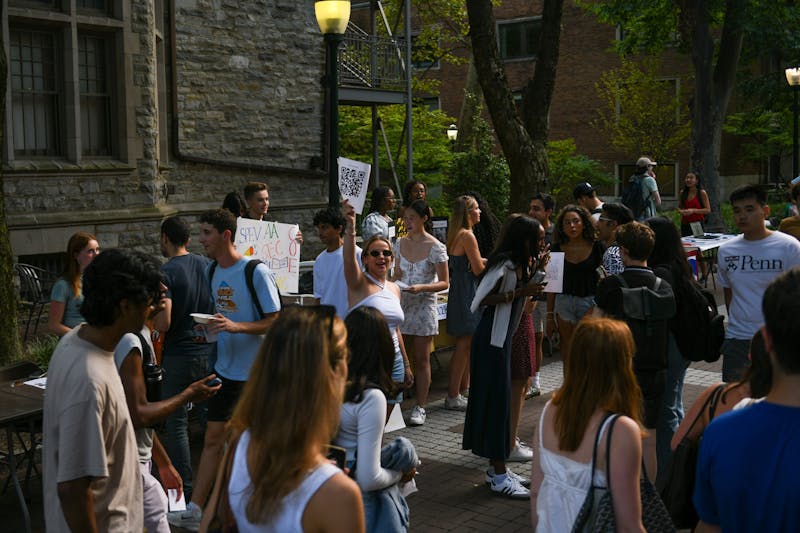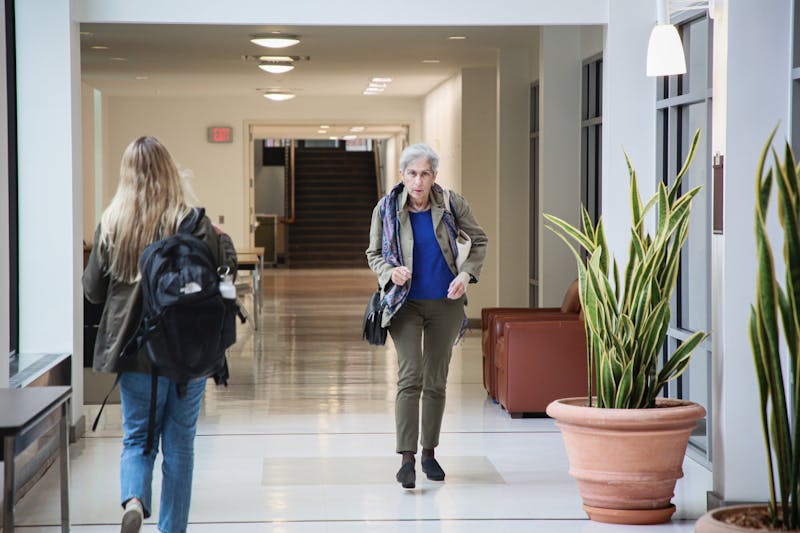
This past Christmas Eve, in the midst of the emotional Tommy-gun fight that doubles as my mother's side of the family, I got a chance to talk for a while with my Uncle Dennis.
A remarkably mild-mannered forty-something with a part as neat as Howdy Doody's, Dennis really is the type of guy who you want to check for a pulse sometimes. His somberness aside, he's a truly intelligent man and a step up from most conversationalists. As a result, I usually make sure to spend a chunk of time with him at family gatherings, while simultaneously ducking my unbearably frenetic aunts.
Pretty quickly, we turned to the topic of the Ph.D. Dennis holds a doctorate in political science, and back when he was still pursuing a spot in the academy, he did some interesting research in Latin America.
He recalled that three years ago, when I was a freshman at Penn, I had expressed real interest in starting on that long road to doctor, so he naturally asked what I thought about the prospect now.
"Not a chance," I put it straight. "It's too hard, too much of a chance that you'll go wrong. You can work all that time and then wind up with no prospects for a job."
With hindsight, I can see that my comment -- although honest -- was less than tactful. Dennis might have taken offense. After all, he never could find a teaching job good enough to keep him in the game, and he long ago moved on to do largely administrative work for -- to use game show introduction parlance -- a major library in Washington, D.C.
Thankfully, Dennis knew I meant no harm by my remark. He went on to tell me about a program in the early planning stages at his library which would provide internships to Ph.D. candidates studying the social sciences and the humanities. The assumption behind this program is that there should be some serious rethinking of the doctoral degree.
The principal critique sounds something like this: A good percentage of Ph.D.s wind up working in realms other than academia after finishing up work on their dissertations. They work in libraries, for foundations, for museums, in university administration. In those capacities, they require sets of skills that the doctoral degree -- as it is presently constituted -- does nothing to develop. Why not start giving Ph.D. students the chance to develop these competencies within the context of the half-decade (or more) they spend in grad school?
Prescient insight is usually not easily found at Buckley family gatherings, so I was truly taken by how much I agreed with what Dennis was telling me.
Penn should be at the forefront of this rethinking of the tweediest of degrees. The academic job market is permanently tight, especially when it comes to humanistic disciplines. A study by the Modern Language Association reports that between 1990 and 1995 7,598 individuals were awarded Ph.D.s in either English or a foreign language. Of those language/literature graduates, only 4,288 found a tenure-track position.
Many humanities departments throughout the nation have responded to the frigid job climate by curtailing the number of students admitted to grad programs. This is part of the solution, but not all of it.
If the University would begin to incorporate real-world-leaning opportunities into the Ph.D. experience, it would benefit in two significant ways. First, it would attract students who might otherwise be scared off from seeking a doctorate. Second, it would produce graduate students better prepared to tackle a world where a faculty position may prove impossible.
Although I no longer feel motivated by the thought of spending my life as a professional scholar, the outright sex appeal of that notion is clear. The chance to write and research for a living provides a sense of accomplishment and autonomy that is difficult to come by in corporate America. Some Lionel Trillings in waiting will always be so smitten by this path in life that they will devote themselves to the quest in toto.
That said, many others balk at pursuing a Ph.D. even though they might be equally enamored of the idea of being a professor.
Because choice jobs are so rare, and because Ph.D. programs solely aim to produce scholars, these people shy away.
If things like internships and management experience became part of the Ph.D. process, many more talented young people might roll the doctoral dice.
In addition, diversifying the experience of a Ph.D. candidate would take an extra step in ensuring that Penn's products are well-equipped thinkers.
Most of the grad students I have encountered at Penn have been excellent. Nevertheless, one cannot deny that a number can give off a egghead-elitist vibe. They quickly become the sort of folks that throw dirty looks if you mispronounce "Nietzsche."
For good reason, a person with a Ph.D. should feel like part of an elite class. With that level of education, you enter a world very few people can be a part of. You speak a language few can understand.
With the academic job market the way it is, however, it is essential that universities help prepare their grad students for success in spots other than behind a lectern.
Will Ulrich is a senior Philosophy major from the Brox, N.Y.
The Daily Pennsylvanian is an independent, student-run newspaper. Please consider making a donation to support the coverage that shapes the University. Your generosity ensures a future of strong journalism at Penn.
DonatePlease note All comments are eligible for publication in The Daily Pennsylvanian.







